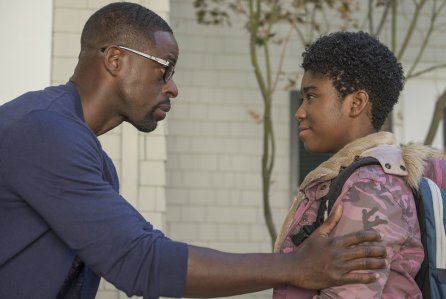There’s a not-so-secret society that could include someone you love – or you.
We have no badges or special handshakes. But we do have a meeting time: Tuesdays on NBC at 9 p.m. EST. Or via Hulu, fans waiting expectantly for the latest episode of “This is Us” to load.
“This is Us” is a television show that became a word-of-mouth sensation after it premiered last year. On the writing and producing team is Bekah Brunstetter, a Winston-Salem native.
“This Is Us” is a rare beast in our Marvel/Fantastic Beasts/Stranger Things world. It’s a quiet, thoughtful, slow drama with zero special effects and not a single hero in sight. Watching each episode, I realize I know these people: a sibling, a friend, a parent.
Mind you, I’ve ponied up the ticket price for blockbusters and binged Stranger Things (written by Durham’s own Duffer brothers). They’re great entertainment.
But “This is Us” has me clutching the tissue box even as I belly-laugh on a weekly basis.
This is a spoiler-free introduction to the series, for those of you who haven’t yet become part of the secret society. “This is Us” follows a Pittsburgh couple as they raise twins and an adopted son who is the same age. The parents and twins are white. The adopted son, Randall (nicknamed Number 3), is African-American.
It’s not too revealing to say that the show gives viewers a lifetime’s worth of what it means to grow up, have a family, know hardship and struggle with adulthood. “This is Us” accomplishes this task with enormous sensitivity. Perhaps I feel this because I see some of my life reflected in the series – as a misfit child, the sister of an adopted sibling, a young adult unsure of my talents, a parent convinced I was ruining my children.
When you are in the thick of living, it’s hard to remember that both the best of times – and the worst – end. That calamities happen to us all, as do moments of grace. That one sibling can be riding high while the other is dragging low. That deep disagreements can tear families apart though reconciliation can be close. That parents struggle with life-or-death issues and still make dinner or comfort their kids during their tragedies.
All of these sharply observed moments are the beautiful background chorus of “This is Us.” Where the show really stands out is when it digs into moments that can – should – make us acutely uncomfortable. The show not only “goes there”; it keeps excavating.
Sterling K. Brown was nominated for a Golden Globe award for best actor in a drama series on Monday, Dec. 11, 2017. The 75th Golden Globe Awards will be held on Sunday, Jan. 7, 2018 on NBC. Ron Batzdorff AP
One example is how the adopted son, Randall, convinces his wife to foster a child. Played by the outstanding Sterling K. Brown, Randall half-realizes he’s attempting to rectify some of the trauma he felt as a child abandoned by his addict father. Brown plays Randall as laser-focused on making everything “off-balance” about his childhood even out.
But Randall’s not working with clay or paints. His medium is a young girl traumatized by having been taken by social services from her troubled mother. The girl, Déjà, doesn’t care a whit for what Randall felt, wants or needs.
The young actress, Lyric Ross, is a study in restrained technique, letting her silence speak to the brokenness inside a child suddenly thrust into the home of strangers. She and Randall come to a beautiful detente, neither one “cured” yet neither one unmoved by the experience.
“This is Us” writer Brunstetter is no stranger to uncomfortable moments. Her father is former N.C. Sen. Pete Brunstetter, an architect of the 2011 Defense of Marriage Act, also known as Amendment One. This deeply homophobic and discriminatory law defined marriage as only between one man and one woman. Passed by our miserable General Assembly in 2012, Amendment One was thrillingly invalidated by the 2014 U.S. Supreme Court decision upholding gay marriage.
Prompted by the law, Brunstetter wrote a play, “The Cake,” about an evangelical Christian and baker who has to decide if she can supply the wedding cake for the daughter of a friend, who is marrying a woman. Produced recently by UNC-Chapel Hill’s Playmakers Repertory Company, the company welcomed Brunstetter and her parents to a performance. The elder Brunstetters remain opponents of gay marriage. Yet they are also crazy proud of their daughter. The cast and crew welcomed them backstage to meet once the curtain dropped.
It’s unlikely any minds were changed (Brunstetter herself told the News and Observer that she and her parents strive “to speak with love and respect” despite their disagreements). And it’s too much to expect such profound differences to be resolved in a night – or by a single television show or play.
But let’s work on this. I believe that stories – about the life challenges we all face at one time or another – will connect us despite the partisan din. At a time when we all seem to be screaming at one another, they remind us that more unites than divides us.
Maybe it’s going to take talking about what moves us in a television show or play or book or movie to push us out of our battlements. Not grand ideologies, but the simple act of sharing hardship and joy, of seeing each other as human.
Likely, this is naïve of me. But really, when you think of it, has anything else really made peaceful change?
Published in the Durham Herald-Sun on December 17, 2017

